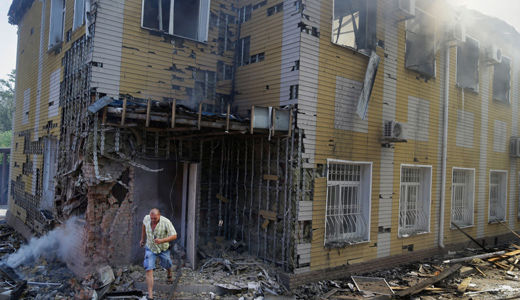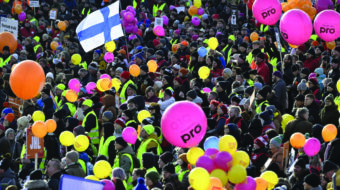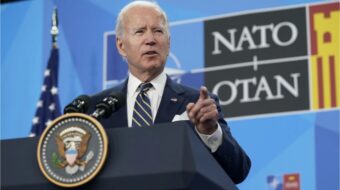
Starting on Thursday this week, North Atlantic Treaty Organization (NATO) leaders will gather in Cardiff, Wales, for a summit meeting at which the Ukraine is going to be the focus. The situation on the ground in Ukraine and the heated-up rhetoric of some of the leaders of the Kiev government, as well as of some Western leaders and politicians, should be cause for serious concern.
In Ukraine, toward the end of August, a combination of regular Ukrainian military supplemented by private militias organized by right wing political groups had been bombarding the Eastern cities of Luhansk and Donetsk. The Kiev forces had been gaining ground while major casualties were suffered by the Luhansk and Donetsk “peoples’ republics” and by the civilian population, which found itself cut off from essential supplies.
Meanwhile, the government of President Petro Poroshenko ousted the Communist Party of Ukraine from the parliament by a maneuver of dubious legality, and put it on trial on trumped up charges of “separatism,” because the communists have called for a decentralized government and an end to the fighting. Poroshenko called for elections on October 26, specifically to remove from the parliament not only the communists but also other opposition members. The military advance and the parliamentary actions have to be seen together as an effort to crush potential opposition to membership of Ukraine in the European Union and also in NATO, for which Ukraine has now applied.
The current conflict in Ukraine began in November, 2013 when President Yanukovych dropped trade negotiations with the European Union and, instead, took up an offer join a customs union with Russia. Although Russia offered a better economic deal to Ukraine, right-wing, nationalist and anti-Russian groups organized demonstrations in Kiev starting in late 2013. When extreme right and even neo-Nazi elements “took these demonstrations to another level” in February, Yanukovych was forced to flee and a new regime was brought in under U.S. and European tutelage. Poroshenko won a May 25 election marred by harassment of the opposition and very low turnout in the east, but by that time much blood had already been shed, including in a massacre carried out by ultra-right militias in the port city of Odessa on May 2.
In August, Russia’s president Vladimir Putin announced that a convoy of nearly 300 trucks would enter Ukraine to bring humanitarian supplies to people in the besieged east. Poroshenko objected, suggesting that the trucks might be full of arms or soldiers. Negotiations with the Red Cross to accompany the convoy broke down because security for Red Cross personnel could not be guaranteed. But the convoy went in on August 19, delivered its cargo of humanitarian supplies, and the empty trucks returned to Russia without incident.
Now the militia battalions that have been spearheading the Kiev military’s advance into Luhansk and Donetsk provinces have suffered major losses and have had to retreat. Forces from Donetsk are threatening to capture the port of Mairupol on the Black sea.
The current claim by Poroshenko that Russia has “invaded” Ukraine arises in the context of these setbacks for the Kiev forces, and also of the NATO summit. There are many sceptics. The Obama administration has been notably cool to the “invasion” rhetoric, especially as it is accompanied by bloodcurdling statements from Ukrainian officials that Europe is about to be plunged into the biggest shooting war since World War II, and that NATO should jump into the fighting in Ukraine.
The United States and Europe are already supplying the Ukrainian military materially, and the California National Guard is training alongside Ukrainian national guardsmen. NATO will probably approve a 4,000 person rapid response unit for action in Ukraine. The United States and European countries have slapped sanctions on some Russian officials and businesses, while various political figures in both places want to see heavier sanctions that will do damage to the Russian economy. The trouble is that, because Europe has major trade with Russia, European economies will be damaged also. Europe is currently in another economic slump, while the Ukrainian economy is near collapse.
Both Putin and the leaders of the Donetsk and Luhansk people’s republics now say that they do not aim at incorporating Eastern Ukraine into Russia, or even its total independence, but propose negotiations on the basis of a federated Ukraine in which those regions would have a special level of autonomy. Ukraine’s government is highly centralized and provincial governors are been appointed directly from Kiev and not elected as they are in the U.S. Up to now Poroshenko has refused to negotiate with Donetsk and Luhansk.
However, at writing, it appears that a truce may be achieved. Ironically, if there is a peaceful settlement, it will be along the lines proposed by the communists, for which they are being persecuted.
As John Mearsheimer has pointed out, the provocateur here is the “West,” including the United States, for shoving NATO expansion right against Russia’s national borders. Our government needs to recognize that it has allied with irresponsible people, and back off before a major escalation is triggered.
Photo: A man runs out of the destroyed building after a bombing in Donetsk, eastern Ukraine. Sergei Grits/AP

MOST POPULAR TODAY

High Court essentially bans demonstrations, freedom of assembly in Deep South

Resource wars rage in eastern Congo, but U.S. capitalism only sees investment opportunity

U.S. imperialism’s ‘ironclad’ support for Israel increases fascist danger at home


UN warns that Israel is still blocking humanitarian aid to Gaza






Comments